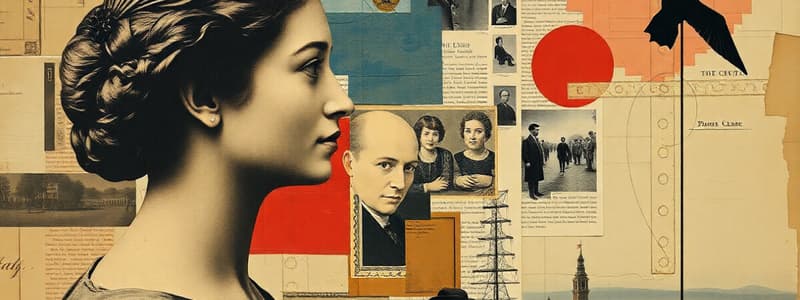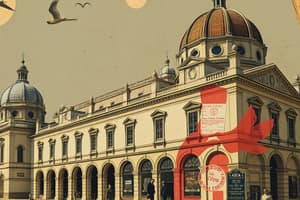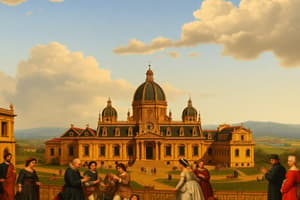Podcast
Questions and Answers
What was the religion that emerged in England due to the Reformation led by Henry VIII?
What was the religion that emerged in England due to the Reformation led by Henry VIII?
- Anglicanism (correct)
- Calvinism
- Catholicism
- Lutheranism
The Catholic Counter-Reformation aimed to diminish the church's power and influence.
The Catholic Counter-Reformation aimed to diminish the church's power and influence.
False (B)
Who was the king that formed the Church of England?
Who was the king that formed the Church of England?
Henry VIII
The Council of Trent was part of the Catholic __________ to address issues raised by the Protestant Reformation.
The Council of Trent was part of the Catholic __________ to address issues raised by the Protestant Reformation.
Match the reformer with their associated religion:
Match the reformer with their associated religion:
Which of the following best defines the Renaissance?
Which of the following best defines the Renaissance?
Humanism during the Renaissance focused on the welfare of mankind rather than solely on the welfare of God.
Humanism during the Renaissance focused on the welfare of mankind rather than solely on the welfare of God.
Who is considered the most ideal Renaissance man?
Who is considered the most ideal Renaissance man?
A _________ is someone who financially supports the arts.
A _________ is someone who financially supports the arts.
Match the following Renaissance figures with their contributions:
Match the following Renaissance figures with their contributions:
What was a significant issue in the church that contributed to the Renaissance?
What was a significant issue in the church that contributed to the Renaissance?
The Italian Renaissance was primarily based on the culture of Africa.
The Italian Renaissance was primarily based on the culture of Africa.
What did Machiavelli focus on in his writing of 'The Prince'?
What did Machiavelli focus on in his writing of 'The Prince'?
What main corruption did Martin Luther criticize in the Catholic Church?
What main corruption did Martin Luther criticize in the Catholic Church?
The printing press hindered the spread of Martin Luther's ideas.
The printing press hindered the spread of Martin Luther's ideas.
What document is Martin Luther known for writing?
What document is Martin Luther known for writing?
John Calvin's new religion is known as __________.
John Calvin's new religion is known as __________.
Which factor contributed to the increasing power of rulers over the pope during the Reformation?
Which factor contributed to the increasing power of rulers over the pope during the Reformation?
Henry VIII branched off from the Catholic Church because he wanted to marry multiple wives.
Henry VIII branched off from the Catholic Church because he wanted to marry multiple wives.
Where did Martin Luther post his 95 theses?
Where did Martin Luther post his 95 theses?
Match the following figures with their contributions or ideas:
Match the following figures with their contributions or ideas:
Flashcards are hidden until you start studying
Study Notes
Renaissance
- The Renaissance was a period of renewed interest in classical learning, art, and culture.
- Key ideas of the Renaissance: Humanism, individualism, secularism, and a focus on intellectual and artistic achievement
- Causes of the Renaissance: The decline of the medieval period, the rise of trade and wealth in Italy, and the rediscovery of classical texts
- Humanism: An intellectual movement focused on human potential and achievements, emphasizing reason, observation, and individual worth.
- The Italian Renaissance drew inspiration from ancient Greek and Roman civilizations and was fueled by the wealth and prosperity of Italian city-states.
- A "Renaissance Man" was someone who excelled in multiple disciplines like art, science, literature, and philosophy. Examples include Leonardo da Vinci and Michelangelo.
- Patron: Individuals or institutions that provided financial support to artists and intellectuals during the Renaissance.
Reformation
- Causes of the Reformation: Corruption within the Catholic Church, rise of Humanism leading to critical thinking, increasing power of monarchs, and theological disputes.
- Martin Luther was a German theologian who criticized the Catholic Church's practices of indulgences, the selling of forgiveness for sins.
- Luther's 95 Theses: A document outlining Luther's criticisms of the Catholic Church, which he posted on the door of a church in Wittenberg in 1517.
- Printing Press: This invention played a crucial role in spreading Luther's ideas and helped to accelerate the Reformation. It also helped to improve literacy.
- Lutheranism: A branch of Protestantism founded by Martin Luther, emphasizing the Bible as the ultimate source of authority and the belief in salvation through faith alone.
- John Calvin was a French theologian who founded Calvinism, a Protestant denomination emphasizing God's absolute sovereignty and predestination.
- King Henry VIII: He broke away from the Catholic Church to create the Church of England (Anglicanism) to obtain a divorce from his first wife and to gain more power.
- Anglicanism: A form of Protestantism established in England by Henry VIII, combining Catholic and Protestant elements and making the king the head of the Church.
Catholic Counter-Reformation
- The Catholic Counter-Reformation was a period of internal reform within the Catholic Church, aimed at addressing the challenges posed by the Protestant Reformation.
- Key goals of the Counter-Reformation: Reinforce and clarify Catholic teachings, address corruption within the Church, encourage spiritual renewal, and reassert the Church's power and influence.
- Significant events of the Counter-Reformation: Council of Trent, establishment of new religious orders like the Jesuits, and the Inquisition.
Studying That Suits You
Use AI to generate personalized quizzes and flashcards to suit your learning preferences.




